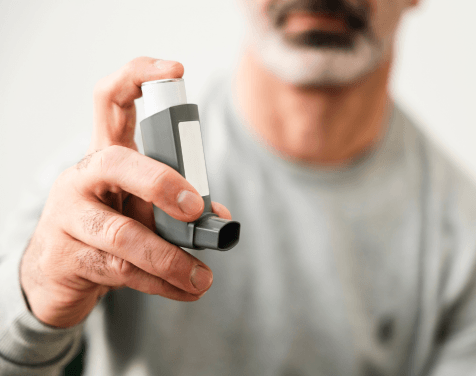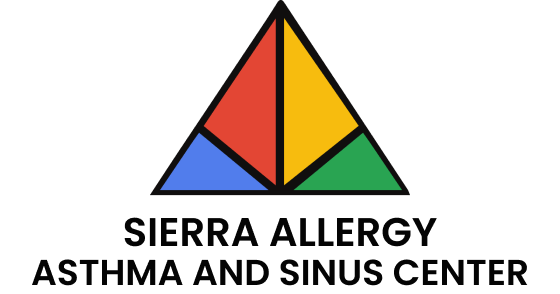Allergies and asthma are both conditions that require treatment immediately after diagnosis. Yes, you need to be very careful in handling your allergies and asthma, because if you do not control them, they control you. To ignore the long term damage to your health, you need to consider your symptoms and start treatment right away, because untreated asthma results in damage to your lungs. Let’s consider the riskful repercussions of unmanaged allergies and asthma in this article.

Defining allergies and asthma
Allergies are a result of the body’s reaction to allergens, which are harmless substances such as pollen, pet dander, certain foods, insect venoms or medications. The body reacts when it produces IgE antibodies to the allergen, releasing histamine and other chemicals that cause inflammation in the skin, airways, or gut. Asthma is a chronic lung disease due to variable airflow obstruction and respiratory symptoms. The inflammation in the nose can extend to the lungs.
Types of allergies
Environmental/Seasonal allergies
Seasonal allergies are triggered when pollens, molds, dust mites, and pet dander. Trees, grass, or ragweed pollens cause sneezing, a runny nose, and itchy eyes.Food allergies
Immune system reacts to foods that you are sensitive to, such as peanuts, shellfish, eggs and milk, leading to hives, swelling, and gastrointestinal symptoms. The allergic reaction is rapid and severe.Insect allergies
Venom from insects causes mild to severe reactions, causing generalized hives, breathing difficulty, or anaphylaxis.Drug allergies
Allergic responses to medications like penicillin, sulfa drugs, NSAIDs cause hives, rash, respiratory distress, and, rarely, anaphylaxis.Types of asthma
Allergic (Atopic) asthma
Most of the asthma cases are allergic, with symptoms starting in childhood and developing with allergens like pollen, dust mites, pet dander, and molds or by viral infections. Patients often have other allergic conditions like eczema or hay fever.Non allergic (Intrinsic) asthma
These are caused by the natural environment, such as cold air, air pollution, smoke, stress or changes in weather. It starts in adulthood and symptoms include wheezing and breathlessness.What happens if allergies and asthma are untreated?
Repeated allergen exposure can “train” the immune system to react more strongly and even to new allergens. For example, allergy sufferers who go untreated are often at risk of becoming allergic to additional substances, leading to more frequent or severe reactions. Allergies can intensify over time, leading to individuals becoming sensitized to additional allergens.
Uncontrolled asthma may lead to chronic inflammation that causes changes in the structure of the airway, resulting in damage and reduced function of the lungs.
How allergies and asthma progress
Chronic inflammation maintains cycles of tissue damage and repair, which in asthma leads to smooth muscle growth, mucus gland enlargement, and fibrosis (airway remodeling). Uncontrolled allergy can prime the immune system for later asthma onset. Nasal allergy increases lower airway inflammation, making asthma more likely or worse if rhinitis remains untreated.

Long term risks and complications
If allergic rhinitis goes untreated, it can lead to chronic sinusitis, nasal polyps and ear infections in children due to blocked Eustachian tubes. Persistent symptoms reduce quality of life, disrupt sleep and impair daily functioning. There is also an increased risk of asthma or worsening of existing asthma.
People with uncontrolled asthma may develop fixed airflow obstruction, resembling COPD, over time. Persistent lung inflammation increases the risk of pneumonia, sleep apnea, and GERD; severe asthma attacks may be fatal without control.
Preventing Worsening: Treatment & Early Intervention
Allergy treatment includes avoidance strategies and medications such as antihistamines and nasal corticosteroids to reduce allergic inflammation and prevent complications and secondary infections. Asthma management should include controller therapy (like inhaled corticosteroids) to reduce inflammation. Avoiding over-reliance on rescue inhalers is vital, and early initiation of anti-inflammatory treatment can protect lung function
Frequently Asked Questions
Can mild allergies really get worse over time?
Yes. Even mild allergies can progress if left untreated. Your immune system may become sensitized to additional allergens, leading to more severe reactions, frequent flare-ups, or new symptoms like asthma.
How does untreated asthma affect my lungs?
Untreated asthma causes chronic inflammation in the airways. Over time, this can lead to airway remodeling permanent structural changes in the lungs that make breathing harder and reduce lung function. In some cases, the damage becomes irreversible.
Is it possible for children to “outgrow” allergies or asthma?
Some children may outgrow certain food allergies (like milk or egg) or have less severe asthma as they grow older. However, many continue to experience symptoms unless their condition is properly managed. In fact, untreated allergies in children can lead to the development of asthma, a progression known as the atopic march.
Can allergic rhinitis turn into asthma?
Yes. If allergic rhinitis (hay fever) is not treated, the inflammation can extend into the lower airways, increasing the risk of developing asthma, especially
What are the signs that my asthma is getting worse?
You may notice more frequent wheezing, chest tightness, coughing (especially at night), shortness of breath, or needing your rescue inhaler more often. These are signs that inflammation is not under control and your asthma may be worsening.
What are the long-term complications of untreated allergies?
Untreated allergies can lead to chronic sinusitis, nasal polyps, ear infections (especially in children), sleep disturbances, reduced focus, and overall poor quality of life. In some cases, they can trigger or worsen asthma.





